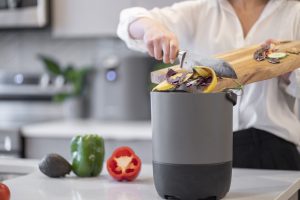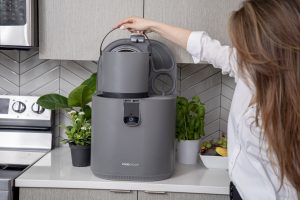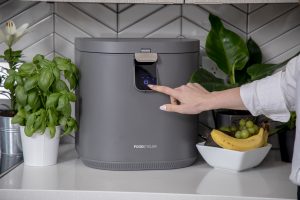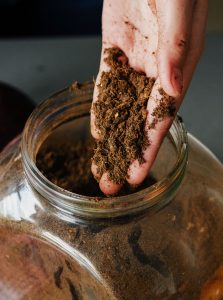In-Home Food Scraps Diversion Pilot Program
The FoodCycler is a home appliance that reduces food waste by up to 90%. Cut trash, enrich soil, and preserve landfill space! To purchase a FoodCycler click here. The District offers residents a variety of options for preventing food waste and diverting it from the trash. For more information, call (508) 979-1493, text (774) 503-0254, or email marissa@gnbrrmdistrict.org.
Why Choose a Home Appliance to Reduce Food Waste?
- The FoodCycler is a convenient home appliance that reduces food waste with the press of a button.
- Quickly create your own nutrient-rich soil amendment rather than having smelly trash.
- Feed nutrients to your plants and know exactly what is in the mix.
- Food waste is the most common material disposed of at the Crapo Hill landfill. It makes up around 20% of the disposed waste. By using a FoodCycler, you reduce the amount of trash you throw out, benefit the environment by improving the soil, and help extend the life of our local landfill.
Purchasing a Discounted FoodCycler
- New Bedford and Dartmouth residents can purchase a lower-cost FoodCycler through the partnership between the Greater New Bedford Regional Refuse Management District and Food Cycle Science. The FoodCycler is being offered at a significant discount provided by Food Cycle Science. Two sizes of FoodCyclers are available. With these significant discounts, the Eco 3 costs $269 plus $20 shipping (retail cost is $499.99). The Eco 5 costs $319 plus $20 shipping (retail cost is $599.95).
- To purchase a FoodCycler click here.
How the FoodCycler Works Click here for the FoodCycler website.
1. Add food scraps to the bucket. Click here to learn more about what can go in the bucket.

2. Place the bucket in the FoodCycler, close the lid, and press start.



3. Store nutrient-rich soil amendment in a dry container with a lid.
Options for Using the End-Product
1. Drop it off in a food waste cart located at your city or town’s recycling center or transfer station. Click here to learn more!
2. Add it to a backyard compost bin. The FoodCycler dehydrates and grinds food scraps accelerating the process of creating nutrient-rich soil amendment. Mix it in with dry leaves and/or strips of plain brown paper. Over time, it will become compost that can be mixed with soil for garden or plants. The District sells low-cost compost bins to New Bedford and Dartmouth residents. Click here to learn how to compost at home and how to purchase a low-cost compost bin.
3. Mix with 20 parts soil and add it to your garden 6 weeks prior to planting seeds or transplanting plants. Click here for the Gardening Guide.
4. Give it away. Give the end-product to family or friends who garden or compost. You could also donate it to a local farmer, community garden or garden center that wants to use it as fertilizer.
5. Register for Curbside Food Scraps Collection. Curbside Food Scraps Collection can help reduce household waste by up to 30%. Residents who pay for this service will have food scraps picked up by Black Earth Compost on a weekly or biweekly basis at their home for a fee. The program currently serves portions of Dartmouth. Residents of New Bedford, and other areas of Dartmouth, can pre-register to show interest. A minimum number of residents must participate to start the program in new areas. Register or pre-register at BlackEarthCompost.com.